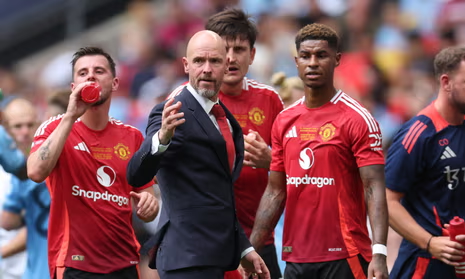The decision to retain Erik ten Hag as Manchester United’s manager has been one of the most surprising moves in recent football discussions. Despite a season marked by underperformance, with Manchester United finishing eighth in the Premier League and facing early elimination from the Champions League, Sir Jim Ratcliffe, the club’s co-owner, has opted to extend ten Hag’s contract for another year. This decision has prompted many to question why ten Hag was given another chance despite the disappointing results.
In an interview with The Sunday Times, Ratcliffe provided some insights into the rationale behind this choice. “Erik has been working hard but found himself overburdened,” Ratcliffe explained. “He was managing the squad while trying to address multiple issues simultaneously.” This admission highlights the multifaceted challenges ten Hag faced during his tenure. The manager was not only responsible for the team’s performance on the pitch but also had to navigate a range of off-field issues, which may have affected the club’s overall performance.
Ratcliffe’s comments also reflect a broader understanding of the difficulties Manchester United has encountered in recent years. The club’s failure to live up to its historical success and financial investments has been a major concern. “Over the last decade, Manchester United should have been a major contender for trophies,” Ratcliffe remarked. “The responsibility to return the club to that level is immense.” This acknowledgment of the club’s underachievement underscores the weight of the task at hand and the pressure on the management to deliver results.
The decision to keep ten Hag is not just about addressing immediate issues but also about maintaining a sense of continuity and stability. In the ever-evolving landscape of football, where managerial changes are often seen as quick fixes, Ratcliffe’s decision reflects a belief in the long-term vision. By extending ten Hag’s contract, the club aims to provide the manager with the necessary time and resources to address the current issues and work towards rebuilding Manchester United’s competitive edge.
Ratcliffe also highlighted a pivotal moment in the club’s history that he believes contributed to the ongoing struggles. He identified the simultaneous departures of Sir Alex Ferguson and David Gill as a significant turning point. “Their exit created a significant void,” Ratcliffe said. “Ferguson and Gill had managed the sports side effectively, leaving a gap when they left.” This insight into the impact of Ferguson and Gill’s departure provides context for understanding the challenges faced by Manchester United. Ferguson and Gill were instrumental in the club’s success, and their exit left a void that has been difficult to fill.
The retention of ten Hag comes at a time when the club is undergoing significant changes. The decision reflects a strategic approach to addressing the issues that have plagued Manchester United, rather than opting for a quick managerial change. Ratcliffe’s comments suggest a commitment to a process of gradual improvement and long-term planning. The focus will be on providing ten Hag with the tools and support needed to address the underlying problems and guide the team back to the top.
The future of Manchester United under ten Hag’s leadership will be closely scrutinized by fans and analysts alike. The club’s management is aware of the magnitude of the challenge and the need for strategic improvements. The emphasis will be on addressing the factors that have hindered the team’s performance and working towards restoring Manchester United to its former status as a major contender in both domestic and European competitions.
The decision to retain ten Hag is also a statement about the club’s approach to managing change. In a football world where managerial changes are often seen as a solution to poor performance, Manchester United’s choice reflects a belief in the value of continuity and stability. By backing ten Hag, the club is signaling its commitment to a longer-term vision, with the understanding that rebuilding and achieving success requires time and persistence.
In conclusion, the decision to keep Erik ten Hag as Manchester United’s manager, despite a challenging season, highlights the club’s commitment to stability and long-term planning. Sir Jim Ratcliffe’s comments reveal a deeper understanding of the factors contributing to the club’s struggles and underscore the importance of continuity in the face of adversity. As Manchester United prepares for the future, the focus will be on overcoming current challenges and striving for success both domestically and in European competitions. The club’s approach reflects a belief in the value of patience and strategic planning as essential components for achieving long-term success.
ALSO READ:Sifan Hassan Wins Women’s Marathon Gold in Paris as Hellen Obiri Claims Bronze


